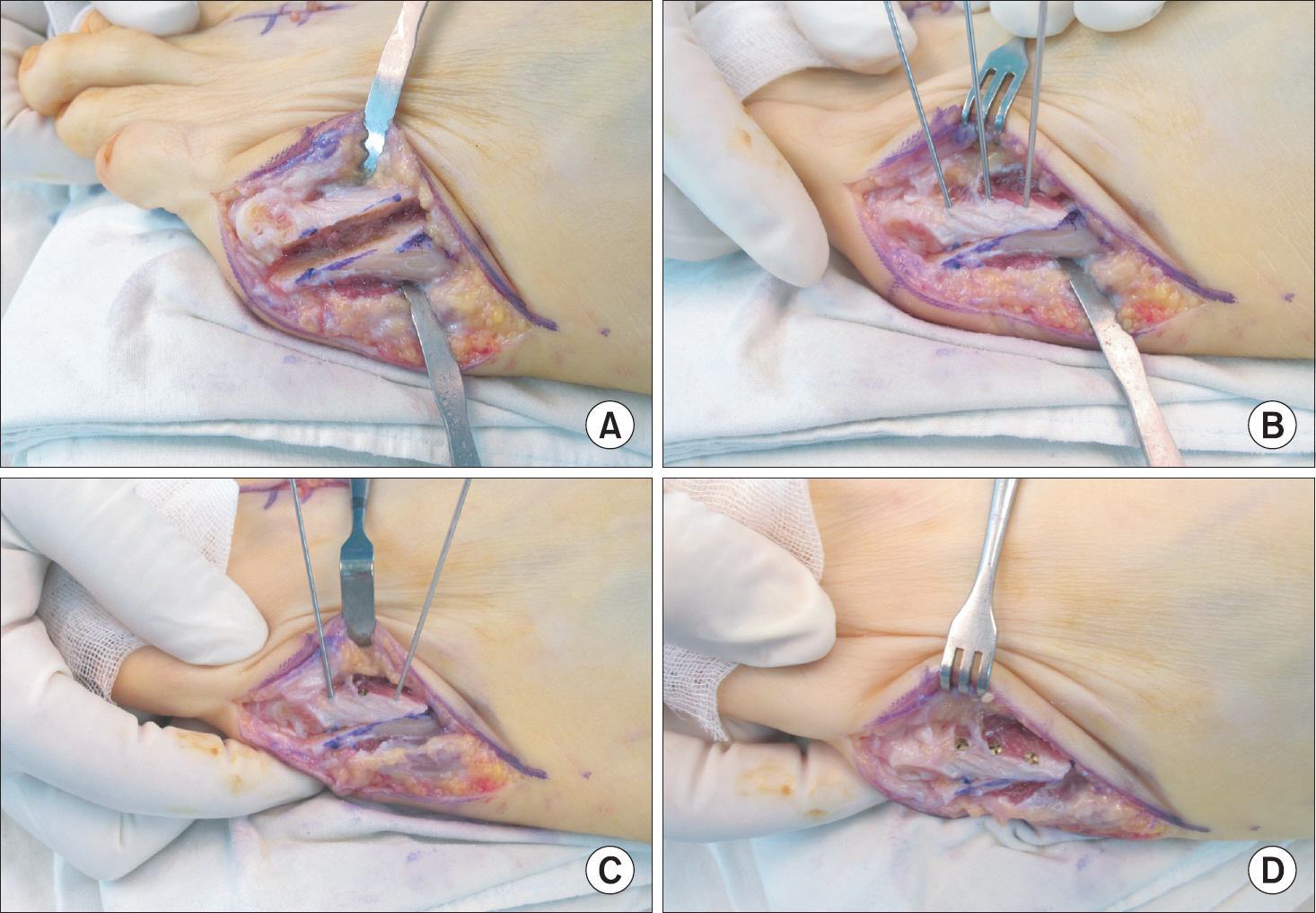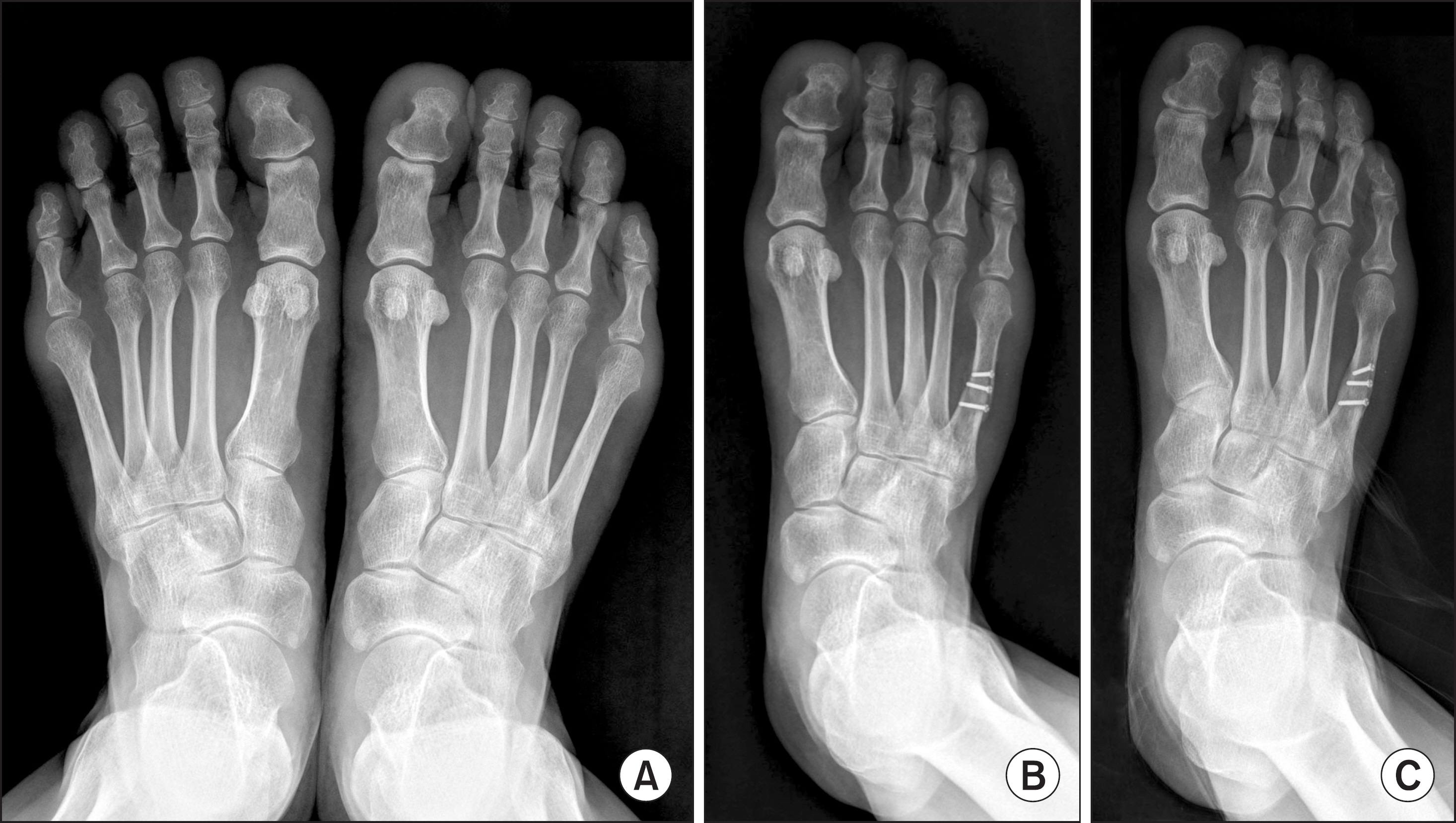J Korean Foot Ankle Soc.
2014 Mar;18(1):19-23. 10.14193/jkfas.2014.18.1.19.
Treatment of Bunionette Deformity with Diaphyseal Oblique Osteotomy
- Affiliations
-
- 1Department of Orthopaedic Surgery, Seoul National University Boramae Medical Center, Seoul, Korea. kjh12344@hanmail.net
- KMID: 1958734
- DOI: http://doi.org/10.14193/jkfas.2014.18.1.19
Abstract
- PURPOSE
The purpose of this study is to evaluate the clinical and radiographic results of symptomatic bunionette treated with a diaphyseal oblique osteotomy.
MATERIALS AND METHODS
We retrospectively reviewed 12 feet of nine patients diagnosed as symptomatic bunionette and treated with diaphyseal oblique osteotomy. All patients were female and the average age at the time of surgery was 48 years. We checked the foot standing anteroposterior, oblique, and lateral images pre- and post-operatively. We measured the fourth intermetatarsal angle and fifth metatarsophalangeal angle and evaluated the clinical results using the American Orthopaedic Foot and Ankle Society (AOFAS) lesser metatarsophalangeal-interphalangeal (MTP-IP) scale preoperatively and six months postoperatively.
RESULTS
Of the nine patients, hallux valgus was combined with symptomatic bunionette in seven feet of five patients. In all of our cases, the average AOFAS lesser MTP-IP scale showed improvement after surgery. Painful callosity around the fifth metatarsophalangeal joint disappeared after surgery in all of our cases. The fourth intermetatarsal angle improved from 12.7degrees to 3.1degrees and the fifth metatarsophalangeal angle improved from 16.6degrees to 2.3degrees.
CONCLUSION
Diaphyseal oblique osteotomy of the fifth metatarsal appears to be a safe and satisfactory surgical procedure for treatment of symptomatic bunionette.
MeSH Terms
Figure
Cited by 2 articles
-
The Impact of the Amount of Displacement of Percutaneous Osteotomy on the Clinical Result in Bunionette
Su-Young Bae, Seung-Joo Lee, Hyung-Jin Chung
J Korean Foot Ankle Soc. 2015;19(2):63-68. doi: 10.14193/jkfas.2015.19.2.63.The Effect of Weightbearing after Distal Reverse Oblique Osteotomy for Bunionette Deformity
Gab-Lae Kim, Yoonsuk Hyun, Jae-Hyuk Shin, Sangmin Choi, Kwon Kim, Junsik Park
J Korean Foot Ankle Soc. 2016;20(4):158-162. doi: 10.14193/jkfas.2016.20.4.158.
Reference
-
References
1. Buchbinder IJ. DRATO procedure for tailor's bunion. J Foot Surg. 1982; 21:177–80.2. Diebold PF, Bejjani FJ. Basal osteotomy of the fifth metatarsal with intermetatarsal pinning: a new approach to tailor's bunion. Foot Ankle. 1987; 8:40–5.
Article3. Coughlin MJ. Etiology and treatment of the bunionette deformity. Instr Course Lect. 1990; 39:37–48.4. Koti M, Maffulli N. Bunionette. J Bone Joint Surg Am. 2001; 83:1076–82.
Article5. Davies H. Metatarsus quintus valgus. Br Med J. 1949; 1:664.
Article6. Brown JE. Functional and cosmetic correction of metatarsus latus (splay foot). Clin Orthop. 1959; 14:166–70.7. Sgarlato TE. A compendium of podiatric biomechanics. San Francisco: California College of Podiatric Medicine;1971. p. 381–96.8. Yancey HA Jr. Congenital lateral bowing of the fifth metatarsal. Report of 2 cases and operative treatment. Clin Orthop Relat Res. 1969; 62:203–5.9. Kitaoka HB, Holiday AD Jr. Lateral condylar resection for bunionette. Clin Orthop Relat Res. 1992; 278:183–92.
Article10. Steinke MS, Boll KL. Hohmann-Thomasen metatarsal osteotomy for tailor's bunion (bunionette). J Bone Joint Surg Am. 1989; 71:423–6.
Article11. Haber JH, Kraft J. Crescentic osteotomy for fifth metatarsal head lesions. J Foot Surg. 1980; 19:66–7.12. Leach RE, Igou R. Metatarsal osteotomy for bunionette deformity. Clin Orthop Relat Res. 1974; 100:171–5.
Article13. Sponsel KH. Bunionette correction by metatarsal osteotomy: preliminary report. Orthop Clin North Am. 1976; 7:809–19.14. Coughlin MJ. Treatment of bunionette deformity with longitudinal diaphyseal osteotomy with distal soft tissue repair. Foot Ankle. 1991; 11:195–203.
Article15. London BP, Stern SF, Quist MA, Lee RK, Picklesimer EK. Long oblique distal osteotomy of the fifth metatarsal for correction of tailor's bunion: a retrospective review. J Foot Ankle Surg. 2003; 42:36–42.
Article16. Ahn JH, Kim HY, Kang JW, Choy WS, Kim YI. Treatment of bunionette deformity with diaphyseal oblique osteotomy. J Korean Foot Ankle Soc. 2008; 12:31–5.17. Diebold PF. Basal osteotomy of the fifth metatarsal for the bunionette. Foot Ankle. 1991; 12:74–9.
Article18. McKeever DC. Excision of the fifth metatarsal head. Clin Orthop Relat Res. 1959; 13:321–2.19. Fallat LM, Buckholz J. An analysis of the tailor's bunion by radiographic and anatomical display. J Am Podiatry Assoc. 1980; 70:597–603.
Article20. Kitaoka HB, Alexander IJ, Adelaar RS, Nunley JA, Myerson MS, Sanders M. Clinical rating systems for the ankle-hindfoot, midfoot, hallux, and lesser toes. Foot Ankle Int. 1994; 15:349–53.
Article21. Schoenhaus H, Rotman S, Meshon AL. A review of normal intermetatarsal angles. J Am Podiatry Assoc. 1973; 63:88–95.
Article22. Steel MW 3rd, Johnson KA, DeWitz MA, Ilstrup DM. Radiographic measurements of the normal adult foot. Foot Ankle. 1980; 1:151–8.
Article23. Gerbert J, Sgarlato TE, Subotnick SI. Preliminary study of a closing wedge osteotomy of the fifth metatarsal for correction of a tailor's bunion deformity. J Am Podiatry Assoc. 1972; 62:212–8.
Article24. Nestor BJ, Kitaoka HB, Ilstrup DM, Berquist TH, Bergmann AD. Radiologic anatomy of the painful bunionette. Foot Ankle. 1990; 11:6–11.
Article25. Fallat LM. Pathology of the fifth ray, including the tailor's bunion deformity. Clin Podiatr Med Surg. 1990; 7:689–715.26. Mann RA, Mann JA. The bunionette deformity. Instr Course Lect. 2004; 53:303–9.27. Cohen BE, Nicholson CW. Bunionette deformity. J Am Acad Orthop Surg. 2007; 15:300–7.
Article
- Full Text Links
- Actions
-
Cited
- CITED
-
- Close
- Share
- Similar articles
-
- Treatment of Bunionette Deformity with Diaphyseal Oblique Osteotomy
- Bunionette Deformity
- The Impact of the Amount of Displacement of Percutaneous Osteotomy on the Clinical Result in Bunionette
- Treatment of Bunionette Deformity with Distal Chevron Osteotomy
- The Effect of Weightbearing after Distal Reverse Oblique Osteotomy for Bunionette Deformity




